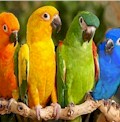One common misconception about pet birds is that they live for hundreds of years and need to be willed to someone in order to ensure their care after you're gone. While birds do live for quite a long time in the wild, their lifespan in captivity is actually much shorter. Below are some common pet birds and their average life span in captivity given that they receive superior care and a proper diet.
Macaw – 50 years
Cockatoo – 40 years
African Grey – 25 years
Amazon Parrot – 50 years
Conure – 15 years
Parakeet – 15 years
Parrotlet – 15 years
Lovebird – 10 years
Canary – 15 years
Finch – 5 years
Certainly with a lifespan of 50 years, a bird could outlive you however there are many hidden dangers lurking around that can cut your birds life short. Birds are very fragile and need to be cared for properly in order for them to live a long life.
Here are some things you can do to help keep your bird safe and healthy:
One major danger for birds as fumes from chemical products. Aerosol sprays, Teflon pans and even such things as furniture polish can kill your bird. Keep anything that has a strong odor away from your bird and make sure you use it in a well ventilated area. I suggest you get rid of all your Teflon pants however if you insist on keeping them make sure your bird is nowhere near the kitchen when you're cooking with them and also be sure not to heat them up without food in them as this will cause the Teflon to emit more odor.
Pet birds love to chew on things and will in fact chew on anything they can find whether it's good for them or not. It's important not to let them chew on anything that is welded as they can get lead poisoning from the slaughter in the joints. They also will love your household plants and will nibble on them so you need to be sure that any plants you have are not poisonous to birds.
Birds love to eat fresh fruits and vegetables but you need to take care not to leave the fruits and vegetables out too long or they can start to rot. Just like you wouldn't feed a piece of pineapple that was sitting on the counter for three hours to your family, you shouldn't be this to your bird either. Something should never be offered to birds as food such as coffee chocolate and avocado as these are toxic to our feathered friends.
The holidays pose a special threat to birds as they may want to fly into your tree and chew on it. You need to be very careful with this, however as many trees are sprayed with stuff that is toxic to birds. In addition, the ornaments, tinsel and electric lights might seem attractive to your pet bird but, of course ,could be very dangerous for him to chew on.
Birds that are allowed to fly around the house can be fun but you need to think of safety first if your bird does not have clipped wings and has free reign to fly wherever he wants. Obviously, you want to make sure your windows are closed so that he cannot get out. In addition, you probably want to pull down the shades or close the curtains when your birds flying around as you don't want him to fly into the closed window and hurt himself. If you cannot do this, then put some decals on the glass so that your bird will know not to fly into it. The same goes for Mariners or any reflective surface. This is very important as your bird can actually break his neck by flying into them.
Another thing to be careful of is standing water such as water in the sink or toilet you don't want your bird to get in over his head and drown!
Please refrain from cooking while your bird is flying around as you don't want him to win on the stove and burn himself.
Finally, make sure that you do not answer the door while your birds perched on your shoulder. Even a bird with clipped wings could get away in an updraft and their many dangers outdoors such as cats and cars that can harm your bird.
Feeding your bird a nutritious diet and keeping him safe may not ensure that he outlives you but it will go a long way to making sure that he has a long healthy and happy life!
